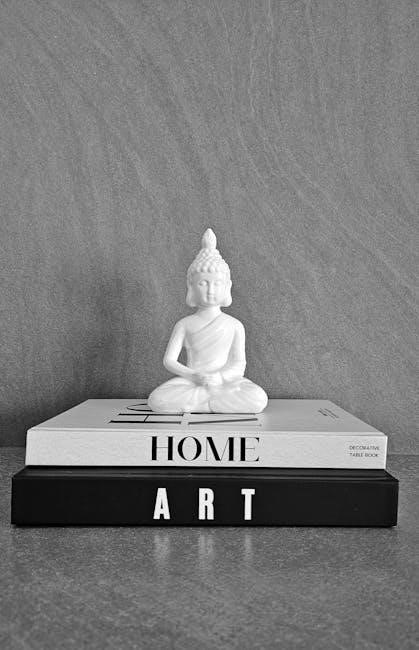“The Art of Living” by Epictetus is a timeless guide to Stoic philosophy‚ offering practical wisdom for a fulfilling life. Available as a PDF‚ it remains a vital resource for modern readers seeking clarity and inner strength.
1.1 Overview of the Book
“The Art of Living” by Epictetus is a concise yet profound guide to Stoic philosophy‚ compiled from the teachings of the former slave-turned-philosopher. The book emphasizes self-control‚ resilience‚ and the importance of living in harmony with nature. It explores themes such as the power of choice‚ the futility of worrying about external events‚ and the pursuit of inner peace. Written in a clear and accessible style‚ the book is structured as a series of short‚ impactful passages that encourage reflection and personal growth. Available as a PDF‚ it remains a timeless resource for anyone seeking wisdom on how to navigate life’s challenges with clarity and grace.
1.2 Importance of Epictetus’s Teachings
Epictetus’s teachings are timeless and universally applicable‚ offering guidance on how to navigate life’s challenges with resilience and wisdom. His philosophy‚ rooted in Stoicism‚ emphasizes the power of mindset and self-control. By focusing on what lies within our control‚ his teachings help individuals cultivate inner peace‚ regardless of external circumstances. The principles he outlines are not just theoretical but practical‚ providing a framework for ethical living and personal growth. His ideas have influenced countless thinkers and remain relevant today‚ making his work a vital resource for anyone seeking to improve their mental and emotional well-being.
1.3 Relevance in the Modern World
Epictetus’s teachings in “The Art of Living” remain profoundly relevant today‚ offering timeless wisdom for navigating life’s challenges. In a world filled with stress and uncertainty‚ his principles of self-control‚ resilience‚ and focusing on what lies within our power resonate deeply. The PDF version of the book provides easy access to these insights‚ making them accessible to a global audience. By emphasizing the importance of mental discipline and gratitude‚ Epictetus’s philosophy helps modern readers cultivate inner peace and contentment amidst chaos. His ideas transcend time‚ making “The Art of Living” a invaluable resource for anyone seeking to live a more purposeful and balanced life.

The Life and Philosophy of Epictetus
Epictetus‚ a former slave‚ became a renowned Stoic philosopher‚ emphasizing self-control and inner peace. His teachings‚ now in “The Art of Living” PDF‚ inspire modern readers.
2.1 Early Life and Background
Epictetus was born into slavery in ancient Greece around 55 AD. Despite his enslavement‚ he received an education and developed a deep interest in philosophy. After gaining his freedom‚ he became a prominent Stoic teacher‚ emphasizing the importance of mental resilience and self-control. His experiences as a slave profoundly shaped his philosophy‚ which focuses on embracing adversity and finding inner peace. Exiled to Nicopolis‚ Epictetus established a school where he taught individuals from all walks of life. His teachings‚ now compiled in “The Art of Living‚” reflect his journey from hardship to wisdom‚ offering timeless lessons on living a virtuous life.
2.2 The Development of Stoicism
Stoicism emerged in ancient Greece‚ founded by Zeno of Citium‚ emphasizing reason‚ self-control‚ and indifference to external events. It evolved through philosophers like Cleanthes and Chrysippus‚ refining its principles. Epictetus‚ a former slave‚ popularized Stoicism‚ making it accessible to all. His teachings focused on the distinction between what is within and beyond one’s control‚ advocating for inner strength and contentment. The philosophy gained prominence in Rome‚ influencing thinkers like Marcus Aurelius. Its enduring appeal lies in its practical wisdom for navigating life’s challenges. The PDF version of “The Art of Living” captures Epictetus’s insights‚ offering timeless guidance for modern readers seeking resilience and clarity.
2.3 Key Principles of Epictetus’s Philosophy
Epictetus’s philosophy revolves around self-control‚ resilience‚ and the pursuit of virtue. He emphasizes the dichotomy of control‚ distinguishing between what is within our power and what is not. He teaches that true freedom lies in focusing on the former and accepting the latter with equanimity. The power of thought is central; Epictetus argues that our experiences are shaped by our perceptions‚ not external events. He advocates for self-discipline‚ living in harmony with nature‚ and cultivating gratitude. His teachings stress the importance of living virtuously‚ embracing adversity as a teacher‚ and finding contentment in simplicity. These principles remain timeless‚ offering practical wisdom for everyday life.

Core Themes in “The Art of Living”
Epictetus’s The Art of Living explores core themes like mastering thoughts‚ embracing self-discipline‚ and finding strength in adversity‚ empowering individuals to live intentionally and authentically.

3.1 The Power of Thought and Perception
Epictetus emphasizes that our thoughts shape our reality. By controlling perceptions‚ individuals can transform challenges into opportunities‚ fostering resilience and peace. This philosophy teaches that external events are neutral; it is our judgment that assigns meaning. Mastery of thought allows us to distinguish between what we can and cannot control‚ aligning actions with values. This principle is central to Stoicism‚ empowering individuals to embrace life’s unpredictability with equanimity. By reframing perspectives‚ one can cultivate inner strength‚ leading to a life of clarity‚ purpose‚ and harmony. This timeless wisdom remains a cornerstone of personal growth and self-mastery in “The Art of Living.”
3.2 The Role of Self-Discipline
Self-discipline is a cornerstone of Epictetus’s philosophy‚ enabling individuals to navigate life’s challenges with resilience. By mastering desires and emotions‚ one achieves mental clarity and focus. Epictetus emphasizes that true freedom lies in self-control‚ allowing individuals to act in alignment with their values. Discipline strengthens the mind‚ fostering patience and persistence. It teaches individuals to distinguish between necessary and unnecessary actions‚ ensuring alignment with long-term goals. Through self-discipline‚ one cultivates inner strength‚ essential for overcoming adversity and living a virtuous life. Epictetus’s teachings encourage readers to embrace discipline as a lifelong practice‚ leading to greater harmony and fulfillment. This principle remains central to his timeless wisdom.
3.3 Embracing Adversity

In “The Art of Living‚” Epictetus emphasizes that adversity is an inherent part of life and should be embraced‚ not avoided. He teaches that suffering arises not from events themselves but from our perceptions of them. By accepting what is beyond our control and focusing on what we can influence‚ we cultivate resilience. Epictetus argues that challenges are opportunities for growth‚ allowing us to develop inner strength and wisdom. His philosophy encourages readers to view hardships as natural parts of life‚ fostering a mindset of acceptance and equanimity. This approach helps individuals navigate difficulties with grace and emerge stronger.
Practical Applications of Epictetus’s Teachings
Epictetus’s teachings offer practical advice for daily life‚ emphasizing mindfulness‚ self-control‚ and focusing on what one can control‚ providing actionable steps for personal growth and emotional resilience.
4.1 Daily Practices for Inner Peace
Epictetus advocates for simple yet powerful daily practices to cultivate inner peace. These include morning meditation to set intentions‚ journaling to reflect on values‚ and evening reflection to assess actions. He emphasizes living in accordance with nature and focusing on what is within one’s control. Practicing gratitude‚ self-discipline‚ and mindfulness helps individuals navigate life’s challenges calmly. Regular introspection and self-awareness are key to maintaining emotional balance. By incorporating these habits‚ one can align their daily life with Stoic principles‚ fostering a sense of tranquility and purpose. These practices are accessible and timeless‚ offering a pathway to enduring inner harmony.
4.2 Managing Emotions Effectively
Epictetus teaches that emotions arise from our judgments‚ not events themselves. By focusing on what we can control‚ we can manage emotions like anxiety or anger. He advocates for self-awareness and pausing before reacting‚ allowing us to respond rationally rather than impulsively. This approach helps cultivate emotional resilience‚ enabling us to navigate life’s challenges with equanimity. His practical advice encourages readers to observe their emotions without being enslaved by them‚ fostering a mindset of calm and clarity. This chapter provides timeless strategies to master emotions‚ ensuring they serve us rather than dictate our actions.
4.3 Cultivating Gratitude and Contentment
Cultivating gratitude and contentment is a cornerstone of Epictetus’s teachings. He emphasizes the importance of appreciating what one has‚ rather than lamenting what is lacking. By focusing on the present and recognizing the blessings in life‚ individuals can foster inner peace. Epictetus suggests practicing gratitude daily‚ whether through reflection or journaling‚ to shift one’s mindset away from dissatisfaction. This practice helps in embracing life’s simplicity and finding joy in small things. Contentment‚ he argues‚ arises from aligning one’s desires with reality‚ rather than chasing unattainable ideals. This philosophy promotes mental peace‚ resilience‚ and a deeper connection to life’s true values.

The Structure and Style of the Book
The book features concise chapters with aphorisms and dialogues‚ making Epictetus’s teachings engaging and accessible. Its clear structure enhances readability‚ appealing to both ancient and modern readers effectively.
5.1 The Use of Aphorisms and Short Passages
Epictetus’s teachings are presented through concise aphorisms and brief passages‚ making his wisdom easily digestible; These short‚ impactful statements emphasize key principles‚ allowing readers to focus on essential truths. The use of aphorisms ensures that complex ideas are accessible‚ while the brevity of passages encourages reflection and application. This structure aligns with Stoic simplicity‚ avoiding unnecessary complexity. Readers can quickly grasp and internalize the concepts‚ facilitating daily practice. The PDF version retains this clarity‚ preserving the original intent and flow of Epictetus’s lessons. This approach has made “The Art of Living” a timeless and practical guide for seekers of wisdom.

5.2 The Role of Dialogue in the Text
Epictetus’s teachings often take the form of dialogues‚ creating a dynamic and engaging reading experience. These conversations simulate real-life discussions‚ making the philosophy relatable and accessible. The dialogues are not mere intellectual exercises; they provoke reflection and self-examination. By presenting his ideas through dialogue‚ Epictetus draws readers into his world‚ encouraging them to question their assumptions and beliefs. This format makes the text feel personal and interactive‚ as if the reader is part of the conversation. The dialogues cover various aspects of life‚ offering practical advice and insights that resonate deeply. This approach ensures the teachings are not just read but lived and applied‚ fostering a deeper connection with the reader.

5.3 The Accessibility of the Teachings
Epictetus’s teachings in “The Art of Living” are remarkably accessible‚ making timeless wisdom available to everyone. The PDF version ensures easy access‚ allowing readers to engage with the content anywhere. His principles‚ rooted in Stoicism‚ are presented with clarity and simplicity‚ free from complex jargon. This makes the book approachable for individuals from all walks of life‚ regardless of their philosophical background. The practical nature of his advice enables readers to apply it directly to their daily lives‚ fostering personal growth and resilience. The clear structure and concise language further enhance the accessibility‚ ensuring that Epictetus’s insights remain relevant and impactful in modern times.

The Impact of “The Art of Living” on Readers
The Art of Living profoundly transforms readers‚ fostering resilience‚ clarity‚ and purpose‚ inspiring personal growth and a fresh perspective on life’s challenges‚ as offered in the PDF.
6.1 Personal Growth and Transformation
Reading “The Art of Living” sparks profound personal growth by reshaping readers’ mindsets. Epictetus’s teachings encourage self-awareness‚ helping individuals identify and challenge negative thought patterns. His emphasis on self-discipline and emotional mastery empowers readers to take control of their lives‚ fostering resilience and confidence. The book’s wisdom inspires transformation by guiding readers to reevaluate their priorities and focus on what truly matters. By embracing Stoic principles‚ readers cultivate inner strength‚ leading to a more authentic‚ purpose-driven life. The practical advice in the PDF version makes it easier for modern readers to apply these transformative lessons in their daily lives.
6.2 Building Resilience and Mental Strength
Epictetus’s teachings in “The Art of Living” emphasize the importance of cultivating resilience and mental strength. By focusing on what lies within our control and accepting what does not‚ readers learn to face challenges with equanimity. The book encourages practices like visualization of adversity and mindfulness of thoughts‚ helping individuals develop a resilient mindset; These principles empower readers to navigate life’s difficulties with confidence and clarity‚ fostering inner strength that endures through trials. The practical wisdom shared in the PDF version of “The Art of Living” equips modern readers with timeless tools to build resilience‚ transforming obstacles into opportunities for growth and self-improvement.
6.3 Finding Purpose and Meaning in Life
Epictetus’s teachings in “The Art of Living” guide readers to discover their purpose by focusing on what truly matters. He emphasizes living in harmony with nature and cultivating virtues like integrity and compassion. By aligning actions with core values‚ individuals can find meaning even in challenging circumstances. The book encourages readers to embrace their roles in life and pursue goals that align with their highest potential. This approach fosters resilience and fulfillment‚ helping individuals navigate life’s uncertainties with clarity and purpose.
Epictetus’s “The Art of Living” remains a profound guide‚ offering timeless wisdom for personal growth and resilience. Its teachings‚ accessible in PDF‚ continue to inspire seekers of a meaningful life.
7.1 Final Thoughts on the Book
“The Art of Living” by Epictetus is a treasure of timeless wisdom‚ offering practical advice on living a virtuous and resilient life. Its teachings‚ distilled into accessible PDF formats‚ provide readers with a clear roadmap to personal growth and inner peace. Epictetus’s philosophy emphasizes self-control‚ gratitude‚ and the power of choice‚ making it a transformative read for anyone seeking to navigate life’s challenges with clarity and purpose. This book is not just a historical text but a living guide that continues to inspire individuals to embrace their potential and find true fulfillment in life.
7;2 Encouragement to Read the PDF Version

Reading the PDF version of “The Art of Living” by Epictetus offers a convenient and accessible way to absorb timeless wisdom. The format allows for easy navigation and highlighting‚ making it ideal for reflection. By downloading the PDF‚ you can carry Epictetus’s teachings wherever you go‚ revisiting them in moments of need. This practical guide to Stoicism is not just a book—it’s a tool for transforming your life. Take the first step toward cultivating inner peace‚ resilience‚ and clarity by embracing this invaluable resource. Let Epictetus’s words inspire you to live with purpose and intention‚ starting today.
